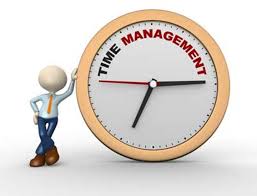Time is precious, we never seem to have enough of it. “The dictionary defines time as ‘the point or period at which things occur,” in simple terms time is when stuff happens. How can we make the best use of our time and not waste it?
Here are a few tips to help you get more from your day.
1- Maintain a to-do list
Create a to-do list and make it a habit to continually update it daily. Include urgent and non-urgent items so you’ll never forget or overlook anything again. Break down your tasks into specific action points.
For example, instead of writing “Prepare Performance Reviews,” write:
- Research absenteeism records on employees
- Review personal files
- Read last review notes
- Assess performance
- Prepare “Performance Review” documentation
- Arrange meetings with employees to discuss reviews
2- Time each task
Keep track of your time by 15 minute increments for 2 weeks to see how you actually spend your time. Compare this to what you should be or want to be spending your time on. It will give you the motivation to make needed changes..
3- Set and respect deadlines
Be realistic about setting deadlines and strive to meet them. It’s true that any task takes the exact amount of time allotted to it. Have you ever noticed how quickly you can blitz through paperwork, delegate assignments, and make decisions on the last day before you go on holiday? Although we tend to get a lot done when we are under pressure, it is a lot less stressful and considerably more professional to establish and stick to an action plan.
AVOID WASTING TIME
4- Use your time wisely
Consider accessing your e-mail only at certain times of the day and let your voice mail pick up your calls to give you an uninterrupted hour or two. If possible, never touch the same piece of paper or e-mail twice. Do not open your mail unless you have time to read it and take action on it; that is, reply to it, delegate it, file it or discard it.
5- Get Organised
Organise your desk – your hard-copy and computer files and your e-mail folders so you can find things easily. Far too much time is wasted searching for lost information.
6- Stay on task
Have a clearly designated “in” basket so people do not put things on your desk randomly. Have you ever returned from a meeting to find extra files, letters and documents all over your desk? Instead of following your own schedule, you probably became side-tracked by someone else’s priorities.
7- Avoid disruptions
If you have a door, close it occasionally. Having an “open-door policy” can be self-defeating if you don’t have the time to really listen to their questions and concerns. If a co worker comes to your desk when you’re too busy to chat, ask to set an alternate time to meet.
STREAMLINE TEAMWORK
8- Collaborate and cooperate
Colleagues will expect your work to be done on time, so be sure to avoid any delays. You’ll have the same expectations of them. To be safe, build extra time into the project time line to counteract unexpected snags, miscommunications or missed deadlines. If your presentation date is the 25th of the month, make sure you have everything scheduled for completion by the 23rd.
9- Avoid unnecessary follow-ups
If you find yourself passing the buck to someone else, let it go unless it is your specific responsibility to oversee it. Too many people waste valuable time listening to other people about their jobs or projects. If your colleagues’ business responsibilities do not impact your day-to-day work or job performance, you should only express an interest by way of supportive conversation.
MAINTAIN YOUR FOCUS
10- Keep busy
Keep your skills sharp by having at least one project on the go at all times. Two or more is even better, as it gives you the opportunity to switch gears and concentrate on something else for a change of pace. Working on different projects simultaneously ensures that you always have something to work on. It also keeps your mind active and your perspective fresh.
11- Stop procrastinating
It is human nature to postpone unpleasant tasks. Schedule some of the more fun aspects of the project to follow the negative ones. If there is a task you particularly dislike plan to do it first thing in the morning when you’re fresh and there are fewer opportunities for distraction. If you continually put things off and miss deadlines, perhaps you should look carefully at your current job, your strengths, and your interests. Habitual procrastination is often a sign of dissatisfaction.
12- Reward yourself
Time management is not entirely about work; it also involves scheduling some downtime to relax and recharge your batteries. Plan rewards once your tasks are completed.




